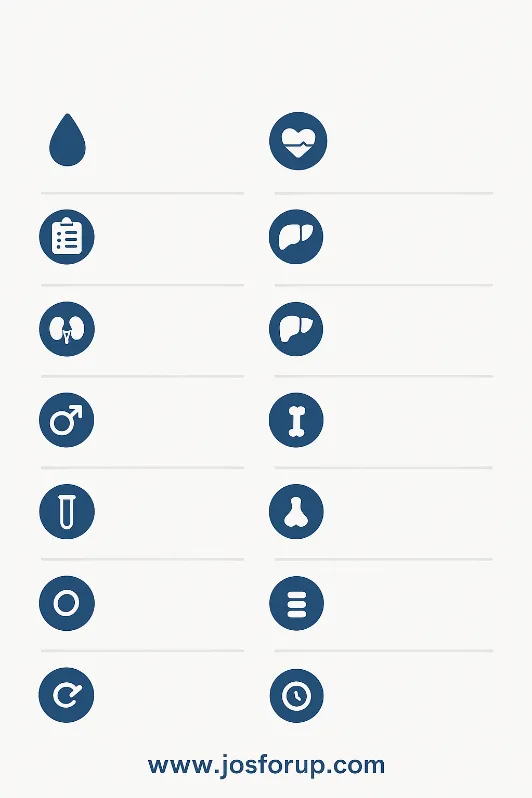Health Check; Crossing the age of 50 is a turning point in life. Many health problems like high blood pressure, diabetes, cholesterol, bone weakness, thyroid disorders, kidney and liver issues can silently begin at this stage without showing clear symptoms. That is why regular preventive health checkups are very important. A proper health screening not only helps in early detection of diseases but also gives you the chance to take preventive action and live a healthier, longer life.
Essential Blood Tests for Age 50 Health Check
1. Complete Blood Count (CBC)
- Purpose: Detects anemia, infection, and immunity-related problems.
- Why: Low hemoglobin is common after 50 and can cause weakness, fatigue, and dizziness.
2. Comprehensive Metabolic Panel (CMP)
- Includes: Kidney function, liver function, electrolytes, proteins.
- Why: Many medicines, diet changes, and lifestyle issues affect the liver and kidneys with age.
3. Lipid Profile (Cholesterol Panel)
- Tests: Total cholesterol, LDL (bad cholesterol), HDL (good cholesterol), triglycerides.
- Why: After 50, risk of heart attack and stroke increases, and this test is key for prevention.
4. Blood Sugar Tests
- Fasting Blood Glucose – Checks sugar after 8–10 hours fasting.
- HbA1c – Shows average sugar control for the past 3 months.
- Why: Diabetes often develops silently in the 40s and 50s.
5. Thyroid Function Tests (TSH, T3, T4)
- Why: Both hypothyroidism and hyperthyroidism become more common in middle age and can cause tiredness, memory loss, weight changes, or depression.
6. Vitamin D & Vitamin B12
- Why: Vitamin D deficiency leads to weak bones, low immunity, and body pain.
- Vitamin B12 deficiency causes nerve damage, memory issues, and tingling in hands and feet.
7. Calcium & Phosphorus
- Why: Bones begin to lose strength, especially in women after menopause.
Heart & Circulation Health Health Check
8. High-sensitivity CRP (hs-CRP)
- Why: Measures hidden inflammation in the body, linked with heart attack and stroke risk.
9. Blood Pressure Check (non-blood test but vital)
- High blood pressure is called the “silent killer” because it has no symptoms but damages heart, brain, and kidneys.
Kidney & Liver Tests Health Check
10. Creatinine, Urea, eGFR
- Why: Kidney diseases grow slowly and can remain unnoticed until advanced stage.
11. Liver Function Tests (ALT, AST, Bilirubin, Albumin, ALP)
- Why: Fatty liver, alcohol use, or hepatitis can damage liver silently.
Age & Gender-Specific Tests
- For Men:
- PSA (Prostate-Specific Antigen) – Detects prostate enlargement or cancer early.
- Testosterone (if symptoms like low energy, muscle loss, or low libido).
- For Women:
- Bone Density Scan (DEXA) – To check osteoporosis risk after menopause.
- Hormone Tests (FSH, LH, Estradiol) – If menopause symptoms are severe.
Other Useful Tests Health Check
12. Iron Studies (Ferritin, Serum Iron, TIBC)
- Detects anemia, chronic disease, or iron overload.
13. Uric Acid
- High uric acid causes gout, joint pain, and kidney stone risk.
14. ESR (Erythrocyte Sedimentation Rate)
- A simple test for inflammation in the body.
Recommended Frequency
- Annual (every year): CBC, CMP, Lipid Profile, Fasting Glucose, HbA1c, Thyroid, Vitamin D, Vitamin B12, Kidney & Liver tests, Blood Pressure check.
- Every 2–3 years: hs-CRP, Iron Studies, PSA (men), Bone Density scan (women).
- As Needed: Cancer markers, hormone panels, autoimmune tests (only if symptoms or family history).
- BMI Calculator
- Firozabad AQI:कांच की चमक के पीछे धुंधलाता
- 2026 Kia Seltos HTE ने ‘Base Model’ की परिभाषा बदल दी है?
- Global Hunger Index (2026): स्थिरता और संकट के बीच जूझती दुनिया
- Firozabad ka aqi kitna hai
Final Summary
At 50, your health priorities shift toward prevention and early detection. A basic health check should cover:
- Heart health (cholesterol, blood pressure, inflammation markers)
- Diabetes risk (sugar and HbA1c)
- Kidney and liver health
- Bone and vitamin levels
- Thyroid and hormones
- Cancer screening (based on gender and family history)
👉 With regular checkups, healthy diet, daily exercise, stress management, and proper sleep, you can maintain good health well into your 60s, 70s, and beyond.
- Apple iPhone 17 Pro Max Launch Date: 10 Reasons to Wait for iPhone 17 Series
- Green Vegetables Benefits – हरी सब्ज़ी खाने से होने वाले 10 बड़े फायदे
- क्या BRICS देश मिलकर अपनी मुद्रा बना सकते है?
- QUAD की बैठक; India-America की तनातनी के बीच क्या रद्द होगी ?
- JPG to PNG to WEBP converter
- Convert Any File Into PDF
- Facts About Tomatoes That You May Not Know
- Age Calculator
- Rashii Khanna: Biography, Career, Movies, Awards and Unknown Facts
